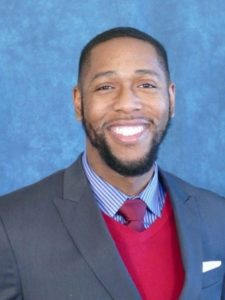A Baptist minister removed earlier this week as a heckler during a speech on religious liberty by Attorney General Jeff Sessions is a graduate of the Wake Forest University School of Divinity and former intern for the Baptist Joint Committee for Religious Liberty.
Darrell Hamilton, 28, pastor for formation and outreach at First Baptist Church of Jamaica Plain in Boston, attributes his forced removal from Monday’s luncheon with a local chapter of the Federalist Society to a “tradition of protest” learned from his former professor, Baptist historian Bill Leonard, and others including longtime BJC leader, the late James Dunn.

Darrell Hamilton II
Hamilton, previously on staff at Cooperative Baptist Fellowship-affiliated Peace Haven Baptist Church in Winston-Salem, North Carolina, said Thursday on Facebook live he spoke up after another minister, Methodist pastor Will Green, was removed for interrupting Sessions’ prepared remarks by quoting verses from the 25th chapter of the Gospel of Matthew to criticize the Trump administration’s immigration policy.
“Brother Jeff, as a fellow United Methodist, I call upon you to repent, to care for those in need, to remember that when you do not care for others, you are wounding the body of Christ,” Green, pastor of Ballard Vale United Church in Andover, Massachusetts, said in video of the exchange circulating on the Internet.
Hamilton, who earned his Wake Forest M.Div. in May 2017, followed up by challenging the notion that a minister exercising his freedom of religion should be removed from a conference celebrating “The Future of Religious Liberty.”
“I honestly felt like it’s very hypocritical and really ironic that we would be at a luncheon with the intention of lifting up the importance of religious liberty and free exercise of religion, there was in fact a Christian minister who was speaking the words of Jesus himself, and … at the sound of those words at the behest of that gospel being proclaimed, they wanted to silence him,” Hamilton told The Resistance Prays, an outlet for progressive people of faith.
“They want to lift up and talk about championing the importance of religious liberty and free exercise,” he described persons who call things like forbidding wedding service providers from turning away same-sex couples or barring tax-exempt organizations from endorsing candidates threats to their religious freedom.
“There was an individual doing just that, but because he was doing it in a way they didn’t agree and because they were possibly hearing a sermon they did not want to hear, they felt that it would be best to remove such a gentleman,” Hamilton said. “I don’t see how you can present yourself as a true champion of religious liberty when in fact someone is exercising his faith, you then choose to escort them out of the room because it is an inconvenience to you.”
Hamilton, described in media reports as a heckler and disrupter, said his presence was conspicuous before he uttered a word, because he was the only person of color in the room not waiting on tables.
“The simple fact that I had entered that space, an all-white space, and I was not in that space in any sort of a servant-like capacity — I was not waiting tables, I was not serving anyone, I was actually there I can maybe say in some respects as a peer, as an equal to many of the people in that room — to enter that space in that capacity, regardless if I said anything at all, was to be a heckler of the space, was to sort of shift it, unnerve it.”
After he spoke, “I was no longer a quiet black person in that space, but now I had elevated my voice in a way – not that I was being aggressive or loud — but in elevating my voice I had elevated my presence” in a way “disrupting,” “disturbing” and “uncomfortable” to other people in the room.
Hamilton said he felt a bit “flustered” when police officers who had previously removed the Methodist minister approached him, and it interrupted his train of thought.
“I also wanted to make sure I was compliant and I wasn’t wanting to do anything that could be construed as violent and overly aggressive,” he said.
He kept talking, because he wanted to point out the “hypocrisy” of the moment while being escorted out of the room.
Hamilton said he didn’t hear some of the boos and comments hurled as he was leaving until he later watched the video, but the police officers treated him politely and allowed him to leave without further incident.
Originally from Edmond, Oklahoma, Hamilton earned a bachelor’s degree in political science at University of Central Oklahoma. He interned at the Baptist Joint Committee for Religious Liberty — an education and advocacy organization supported by groups including the Cooperative Baptist Fellowship — four months while finishing up his graduate degree.
In 2017 he took part in the National Festival of Young Preachers, sponsored by the Academy of Preachers founded by Baptist preacher Dwight A. Moody, former dean of the chapel at Georgetown College in Kentucky.
Between July 2015 and December 2016, Hamilton was pastoral assistant for children and youth at Peace Haven Church in Winston-Salem, North Carolina. His current church, First Baptist in Jamaica Plain, is affiliated with the Alliance of Baptists and the Association of Welcoming and Affirming Baptists.
His pastor, Ashlee Wiest-Laird, is from Louisville, Kentucky. She earned her M.Div. at Southern Baptist Theological Seminary in 1991 and served four years as a Southern Baptist chaplain at Harvard University before earning standing in the American Baptist Churches of Massachusetts and becoming pastor of First Baptist Jamaica Plain in 2003.
